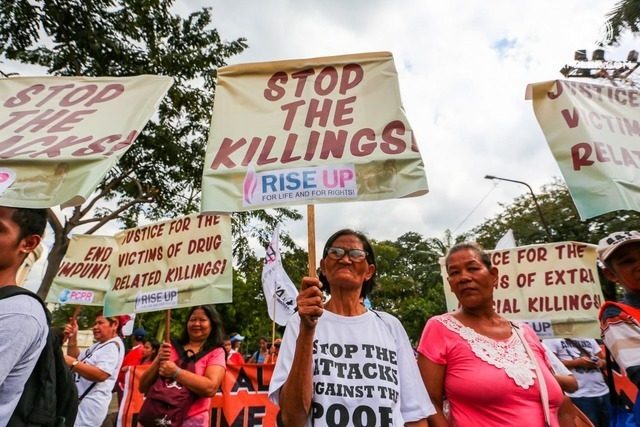SUMMARY
This is AI generated summarization, which may have errors. For context, always refer to the full article.

MANILA, Philippines (3rd UPDATE) – Foreign Secretary Teodoro “Teddyboy” Locsin Jr on Saturday, September 21, downplayed the impact of a Malacañang memo suspending talks for loans and grants from countries that voted in favor of a United Nations Human Rights Council (UNHCR) resolution to review drug war killings in the Philippines.
According to Locsin, the amount of loans and grants affected by the order is “nothing big,” though he did not give an exact value.
“The amounts I hear from time, nothing big. Mostly DOF’s [Department of Finance] remit,” Locsin tweeted.
In another tweet, he said that the aversion of the DOF to such transactions with the concerned countries was “old stuff actually; long before the failed Iceland resolution.”
“DOF didn’t like them; not worth the candle considering the amounts and the terms and the money goes mostly to consultants. Other agencies would badger me; I’d go to DOF; sneered at. Small time,” the country’s top diplomat said.
If it is a memo it is in effect; the amounts I hear from time, nothing big. Mostly DOF’s remit. Not new; long been turning down European grants with onerous or meddling conditions. I have banned European grants to NGOs unless cleared by DFA and NICA.
— Teddy Locsin Jr. (@teddyboylocsin) September 20, 2019
That’s old stuff actually; long before the failed Iceland resolution. DOF didn’t like them; not worth the candle considering the amounts and the terms and the money goes mostly to consultants. Other agencies would badger me; I’d go to DOF; sneered at. Small time. https://t.co/aHb7dSSR2o
— Teddy Locsin Jr. (@teddyboylocsin) September 21, 2019
Locsin was referring to an August 27 Office of the President memorandum ordering all department heads and other government agencies to put on hold talks for loans and grants still being negotiated or about to be signed until relations with countries who supported the UNHRC resolution were reviewed. Signed agreements were not affected.
In June 2019, 18 out of 47 member-countries of the UNHRC, backed an Iceland resolution that asked UN rights chief Michelle Bachelet to write a comprehensive report on the Philippine situation and present it to the UNHRC. Fourteen voted against it and 15 abstained.
The countries that voted to adopt the resolution were Argentina, Australia, Austria, Bahamas, Bulgaria, Croatia, Czech Republic, Denmark, Fiji, Iceland, Italy, Mexico, Peru, Slovakia, Spain, Ukraine, United Kingdom, and Uruguay.
‘Old stuff’
Despite the recent publication of Malacañang’s memo, Locsin said the move was “not new” as the Department of Foreign Affairs (DFA) had long ordered the European Union (EU) to first get clearance from the DFA before donating to the Philippines and other non-governmental organizations in the country.
The top diplomat said the Palace move was a “good idea.”
“We don’t need the money,” he said, adding that the Philippines would only turn to Japan, whose “generosity is unconditional” and motivations were “honestly to help the Philippines.” (Japan abstained from the vote.)
Prior to its memo, Malacañang had rejected assistance from countries it perceived as “interfering” with its crackdown on illegal drugs. It turned down at least P380 million (6.1 million euros) worth of donations from the EU as of January 2018. In 2017, the Philippines also refused to accept more EU grants, pegged at around 250 million euros or P13.85 billion.
Good idea. We don’t need the money; we’ve more than enough without turning to anyone outside except Japan of course whose generosity is unconditional, quick; and whose motivation is honestly to help the Philippines. The rest are tongue in cheek and negligible. https://t.co/PQfe9VlFnV
— Teddy Locsin Jr. (@teddyboylocsin) September 20, 2019
What about poor Filipinos?
After the adoption of the UN resolution in July, Locsin had threatened the 18 countries that voted in favor of it with “far-reaching consequences.” Two months later, however, the top diplomat said he had already “forgiven” Iceland for what he called its “nothing resolution.”
But despite leading the UN resolution, Locsin earlier said the Philippines would not cut diplomatic ties with Iceland. It would also remain in the UNHRC.
Phil Robertson, Human Rights Watch Asia Deputy Director, said in a statement on Saturday that the policy would hurt poor Filipinos the most.
“This symbolic fit of pique by President Duterte to suspend negotiations on aid with certain governments will only hurt those poor Filipinos benefiting from that assistance,” Robertson said.
“Development assistance is a declining resource around the world, so I’m sure those donors can find plenty of other governments in the region who actually care enough about their people to accept the aid. Once again, Duterte tries to act tough but the only people getting hurt by his bravado are the people of the Philippines,” he added.
Opposition senators slammed the move as selfish and anti-poor.
“The country is digging itself into a deeper hole by this retaliation. If it thinks this will make these nations change their minds then it is in for a big surprise,” said Senator Francis Pangilinan.
Senator Leila de Lima said the decision showed “how Duterte prioritizes his own personal interests over and above that of the nation’s.”
“Mas importante kay Duterte na mawalan ng malalaking ayuda ang Pilipinas mula sa mga bansang nais tumulong sa atin, kaysa itigil na lamang ang kanyang polisiyang EJK sa drug war,” De Lima said.
(It’s more important for Duterte to lose aid to te Philippines from countries that want to helpus rather than stop his EJK policy in the drug war.)
De Lima also said that Duterte preferred “onerous loans from China” as that country supports his bloody war on drugs. – Rappler.com
Add a comment
How does this make you feel?
There are no comments yet. Add your comment to start the conversation.